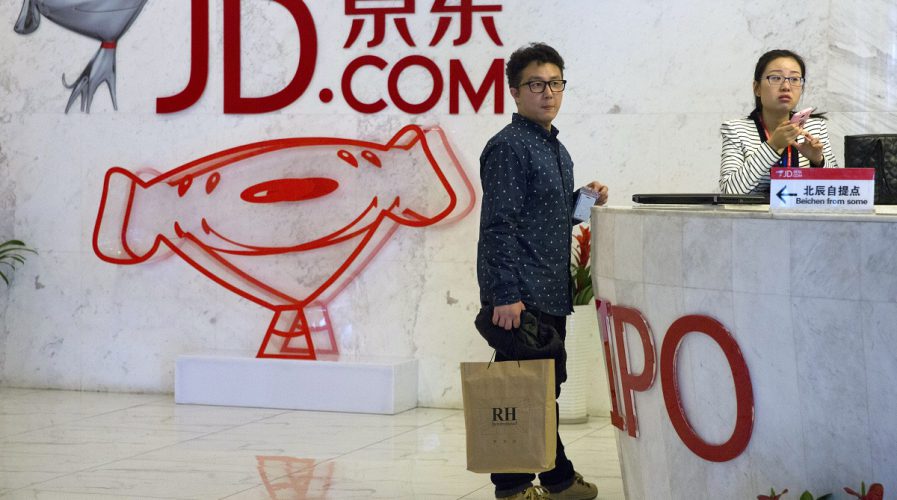
JD.com announced a huge deal with local Thai retailer, Central Group, as it looks to enter the local market. Source: AP
JD.com registers first profits since IPO, continues plans to rival Alibaba
ALIBABA rival JD.com has announced its first quarterly profit since being listed, as a result of strong consumer spending and the successful integration of Wal-Mart Store Inc.’s digital business.
The last few years have seen the e-commerce competition in China heat up between Alibaba Group Holding Ltd. and JD.com as online shopping has become far more commonplace than physical stores, particularly in China where the retail infrastructure is patchy, at best.
JD.com, in a bid to compete with Alibaba, purchased Wal-Mart’s Yihaodian Chinese shopping marketplace in 2016, though Wal-Mart would retain a five percent stake in JD.com, valued at roughly US$1.5 billion at the time.
In return, Wal-Mart would gain access to JD.com’s delivery network and local knowledge of retail demand.
Since the purchase, JD has reported profits of CNY239 million (US$35 million) in the first quarter of 2017, a number which has surpassed estimates of a CNY851 million loss. The financial report also noted a rise in sales numbers by 41 percent.
https://t.co/gHiZbWYSpm $JD Stock Up 8% as the Chinese #eCommerce Giant Reports 41% Jump in Q1 YoY Revenue ? $AMZN https://t.co/ky3nY2akb0 pic.twitter.com/bZ1s6KHahU
— Andreas Cseh (@andreascseh) May 9, 2017
The Chinese e-commerce market has migrated en-masse to mobile and online purchases, and in response, JD has announced it will open its own online and finance division to tackle Alibaba’s Alipay payment platform. The multibillion-dollar deal may close this quarter and would raise funds to bankroll JD’s aspirations of an Asia-wide warehouse-cum-drone delivery network.
The company could risk putting excess pressure on its margins in 2017, though it is an important step to fend off Alibaba’s large logistical network. Analysts warn the profits JD has raked in might be temporary, and subject to the fierce competition expected to rage in the e-commerce sector for the rest of the year.
Officials in JD are optimistic, however – CFO Sidney Huang declared their achievement as a “milestone” for the business. With that being said, he – much like the analysts – suggested future investment plans would weigh heavily on their resources, and expansions could hurt the coming year’s profits through increased capital expenditures.
SEE ALSO: Can LeEco outrun cash problems to achieve its Tesla-sized dreams?
But the fate of businesses like LeEco, who is currently struggling under the financial burden of uncontrolled expansion and expenditures, hangs like a pall over many Chinese companies. The Chinese economic powerhouse has cooled somewhat over the last few years, and with the government’s capital controls, overall sentiment remains uncertain despite the potential for increased earnings in the e-commerce sector.
“Our quarterly earnings will likely be lower in one or more of the next few quarters,” Huang warned.
“The Chinese e-commerce market remains highly competitive and we remain committed to returning a meaningful portion of our incremental gains from scaled economies onto our customers.”
JD.com began as a delivery logistics and retail company, focusing on new markets such as groceries and women’s fashion. The company prides itself on quality service, exemplified in their willingness to splash out some cash on occasion, but they have struggled to keep up with rivals Alibaba.
SEE ALSO: Alibaba forms partnership with high street retailer Bailian group
Don’t expect that competition to slow down anytime soon. The two companies are packing their bags and relocating some of that fiery competition down in Southeast Asia, where JD.com is considering purchasing a majority stake in Indonesian e-commerce marketplace, Tokopedia.
Alibaba already has a presence in the region through the Lazada Group, which is based in Singapore, but offers services in other countries such as Malaysia and Indonesia.
READ MORE
- Strategies for Democratizing GenAI
- The criticality of endpoint management in cybersecurity and operations
- Ethical AI: The renewed importance of safeguarding data and customer privacy in Generative AI applications
- How Japan balances AI-driven opportunities with cybersecurity needs
- Deploying SASE: Benchmarking your approach
